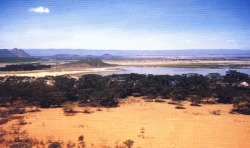|
|
 |
|
|
 |
 |
National
Parks and Game Reserves
|
 |
 |
Okavango
Delta
This is the
largest inland delta in the world. Created when fresh
flood waters flood inland, into the sandy basins of
the Kalahari desert, in the central part of Botswana.
The delta covers a vast 15000 square kilometers. The
flooded plains result in numerous islands which form
unique and diverse eco sytems, home to rich varieties
of wildlife including numerous species of birds. There
are several places of interest in the Okavango, some
of which are listed below.
|
|
|
|
Moremi
National Park
Located centrally
in the Okavango delta, the Moremi National park covers
3000 square km, and is a haven of wildlife. Moremi
consists of waterways around two main islands, Mpoane
Tongue in the east and Chief's Island in the west.
The park has a rich and diverse eco system with minimal
human intrusion, resulting in spectacular wildlife
sightings. There are over 500 species of bird recorded
in this area. The ideal time to visit is the local
winter time, from March to September. Suggested access
is by air from the town of Maun, the tourism center
of Botswana.
|
 |
|
|
 |
Central
Kalahari Reserve
Founded in
1961, this dramatic reserve with an area of 52, 800
sq km, was ironically meant to protect man, not wildlife
! Specifically, this reserve, being the natural home
of the endangered San Bushmen, was established to
preserve their unique way of life. The reserve is
arid to semi arid, with some grasslands and pans breaking
the desert landscape. There are four rivers in the
reserve, the banks of which support habitats for the
wildlife. The southern part of the Kalahari encompases
the Khotse Game reserve.
|
|
|
Chobe
National Park
This park,
in the northern part of Botswana, is known for it's
large concentration of Elephants, as well as it's
natural beauty. Chobe National Park also has a large
variety of other wildlife including mammals and birds.
One may see diverse habitats and vegetation zones
in this park, ranging from savannah grasslands and
woodland, to floodplains and riverine thickets. The
park has the Linyanti and the Chobe rivers flowing
in the northern region and the Savuti channel in the
south.
|
 |
|
 |
|
Makgadikgadi
Pans National Park
In the distant past,
this 2500 sq km park was part of a regional, ancient lake,
possibly as large as the present day Lake Victoria in East
Africa. However this ancient lake dried up leaving vast
salt pans that are even visble on satellite pictures. The
attraction for the traveler is the isolation and solitute
of a trip here. There are pockets of thriving wildlife in
various parts of this park.
|
 |
 |
Gemsbok
National Park
Located in
south west Botswana, this 26000 sq km reserve is typical
of the arid type eoc system coomon in Botswana, such
as the Kalahari. The wildlife here includes animals
such as the big cats and plains game such as herbivores,
as well as close to 200 bird species. Access is by
road from Gabarone.
|
|
 |
|
|
 |
| Francis Town:
A historic gold mining town founded during the gold rush in
Southern Africa. The town which lies at the meeting of the
Tati and Inchure rivers, is now an important tourism center,
a hub for travelers going north and west for safari. This
town has a population of 60000 and is now a commercial and
industrial town. |
 |
| Gaborone:
The capital of Botswana, named after the Chief Gaborone, is
a modern and bustling city, secure and safe to visit for the
traveler, as well as being a comfortable and rewarding place
to be. There are many hotels, shopping malls and intercity
recreational spots in Gaborone. The city is located close
to the border with Sough Africa. |
 |
| Maun:
Situated at the gateway of the Okavango, near Moremi reserve,
Maun is the "tourism capital" of Botswana, with most safari
and air charter companies based here. The town, established
in 1915, has rapidly developed and currently has a population
of 30000. |
 |
|
Climate
|
 |
| Generally
sub tropical, as associated with semi arid regions with variations
due to altitude. Rainfall is minimal, and seasons are the
reverse of climate patterns in the northern hemisphere, such
as Europe. Winter occurs from May to August and is usually
cold and dry. Max day temperatures average 250 C. might time
temperatures are low. Summer occurs from October to March
and sees soaring day time temperatures upto highs of 410C
and the night time high lowers to 220C. Summer also sees most
of the rainfall. The best time to visit is from April to October.
|
|






